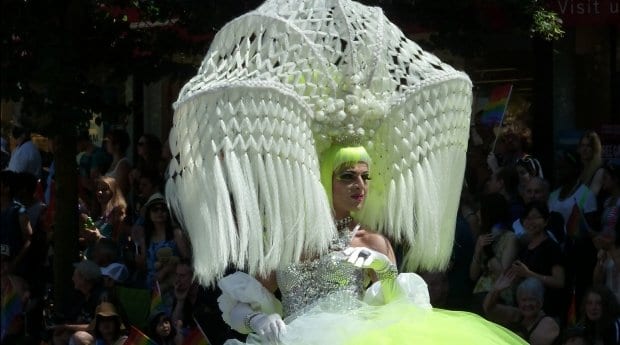
Credit: Ross Johnson
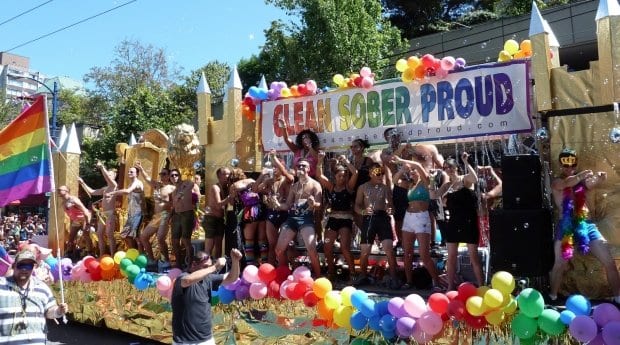
Credit: Ross Johnson
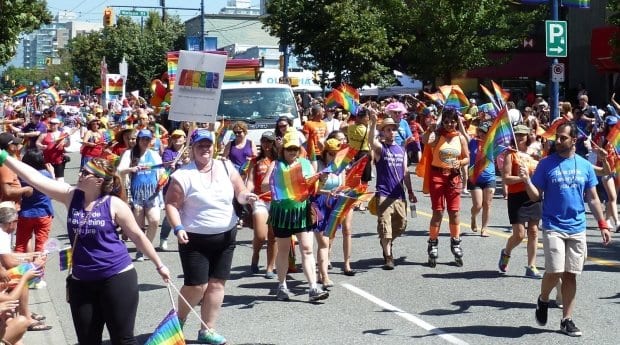
Credit: Ross Johnson
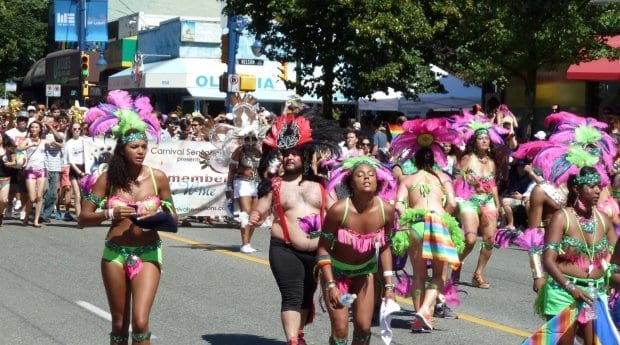
Credit: Ross Johnson
At the stroke of noon, the Dykes on Bikes collectively gunned their 23 motors to jump-start Vancouver’s annual Pride parade Aug 3, raising a cheer from the hundreds of thousands of spectators lining the West End’s streets with their rainbow-themed regalia.
The weaving, circling bikes with their whooping drivers led off the more than three-hour event, which boasted 143 contingents, including community, corporate and political groups, which wound their way in a fairly steady stream west down Robson Street, south across Denman and onto Beach Avenue.
Among the federal party leaders in attendance were the Green Party’s Elizabeth May and the Liberals’ Justin Trudeau, who walked in the Vancouver parade for the first time, along with Vancouver Centre MP Hedy Fry, who has participated in the parade 22 times.
“More people are celebrating with the LGBTQ community; they’re making it their community,” Fry says. “There’s a whole lot of social change going on, that I like . . . lots more to come.”
Vancouver School Board chair Patti Bacchus says there’s more to celebrate locally this year with the board’s approval of a trans-inclusive student policy that was the source of much contention.
“It is such a beautiful celebration of remarkable progress to be celebrating,” says Bacchus, marching in her sixth parade. “We’ve really sent a strong message about what Vancouver public schools are about — we are welcoming, supportive and excited about having everyone be part of our school system, regardless of their sexual orientation or their gender identity or their family.”
Trans Alliance Society secretary Morgane Oger spoke at meetings held by Vancouver’s school and park boards about their respective trans policies earlier this year. She calls the parade “sheer pleasure.” She’d like to see protection from gender-identity-based discrimination added to both provincial and federal human rights codes. She is disappointed that federal Bill C-279 is still blocked in the Senate because, she says, “certain conservative elements are trying everything they can to prevent this really important human rights legislation from seeing the light of day.”
“It’s not something I can predict,” says former Liberal MLA Lorne Mayencourt, asked when BC might add gender identity to its Human Rights Code. Mayencourt, who walked with the BC Liberals contingent, predicts trans rights will be the next area of human-rights progress.
Asked about the longstanding call for a provincewide policy targeting homophobia in schools, Mayencourt says there’s a lot of work that has to be done with school trustees around human rights. “I can’t speak for government today,” he says. “I can tell you that this is one of the number-one issues the premier has identified for things she wants to accomplish — a bully-free environment in our system, extending fair rights to people who are transgender. I think we’re on a right path.”
Mayencourt says Premier Christy Clark did not attend the parade because she is on vacation with her family.
Prior to the parade, grand marshal Gwen Haworth sat with her mom, Colleen, atop the back seat of a convertible, taking in the crowd’s growing excitement in the staging area.
“I brought my mom with me because I just feel like she’s going to love it. She’s come a long way in terms of being aware of queer and trans issues,” Haworth says, adding that being in a crowd of thousands “will just bring it home just how much love and support there is out in the community.”
Colleen, attending her first Pride parade, says being in the event and having her daughter selected as a grand marshal is exciting and amazing.
The Pacific Association of First Nation Women are also participating in their first Pride parade, with 13 traditional grandmothers.
“For too long our community has struggled with gay and lesbian rights, and it’s time to show how many of us feel — that we embrace all our brothers and sisters, everybody as our children, and that’s our traditional values,” says coordinator Sharon Brass, whose traditional name is White Thunderbird Woman. Her nephew, who is a drag queen, is also in the parade. “This is important as an auntie to show we are not just talking; we are really doing,” Brass says.
Laurie McDonald and Peter Dawson represented grand marshal ted northe, a pioneering gay activist and the founder of Canada’s drag court system, who was honoured posthumously. “He’d love it,” both men say, almost in unison, asked how northe might have responded to his appointment as grand marshal. McDonald says northe was a strong supporter of the two-spirit community and says honouring him is a symbol of the unity between native and non-native people.
Grand marshal Dean Nelson is thinking of others around the world who can’t hold this kind of celebration today — “but maybe tomorrow.”
“I think we are really making a difference. Look at what’s happening in the United States; more and more states are actually embracing marriage equality,” he says. “We have more athletes coming out, we’re getting more sports organizations updating their work-environment agreements to make sure their athletes, coaches and trainers are all protected regardless of gender identity, gender expression and sexual orientation. It’s that avalanche we’ve been waiting for.”
Rainbow Refugee’s Sharalyn Jordan hopes the community understands the importance of human rights for gay men, lesbians, bisexuals and trans people everywhere, not just within Canada’s borders. “I feel like there’s a critical traction or momentum building,” she says, somewhat echoing Nelson. About 33 countries were represented under Rainbow Refugee’s banner this year for its seventh appearance in the parade.
“It’s a wonderful platform to get messages out,” says Vancouver Pride Society president Tim Richards, noting that 800 more people participated in this year’s parade than took part last year.
Richards points to the presence of a Chinese dragon, saying it’s a sign of other cultures embracing the diversity of community. “To see all the wonderful allies and everyone here to support us is incredible,” he says.
Vancouver resident Meghan Meath, who has attended five Pride parades, says this year’s parade seemed calmer, which appealed to her. “Long parade; it was such a good time. Everyone is always so happy and accepting, enjoying the day,” she says. “It was just a more relaxed crowd, and maybe it was just better organized this year.”
Partners Jenna Clark and Jill McDugal, who have attended many Pride parades, say they feel lucky to live in a city that supports the event. “People of all ages can come out and celebrate. I think this is so beautiful,” Clark says.
In the lead-up to this year’s Pride, McDugal says, she and Clark noticed more and more people walking down the street holding hands, people that “look like us.”
“It’s such a thrilling feeling, just seeing ourselves mirrored in others in the city and just seeing people in love and being free to express that,” she says, holding Clark’s hand.
Check out our video of the Vancouver Pride parade here! And check back every day this week for more Pride slideshows from Daily Xtra.
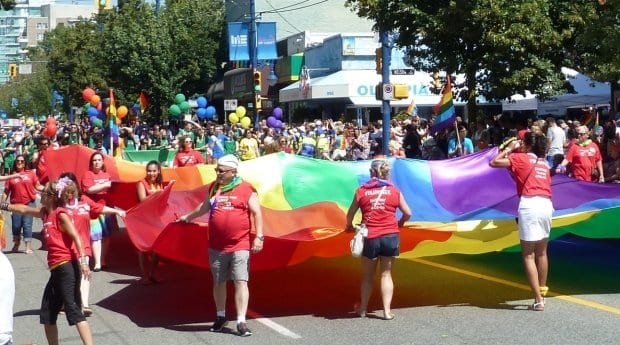

 Why you can trust Xtra
Why you can trust Xtra


